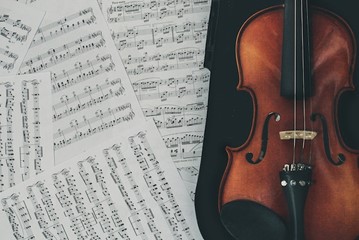The popular phrase, “I love rock and roll,” is relatable to so many! However, today’s rock fans may be surprised to find just how much modern rock owes it’s current sound and fame to classical music. Gerard Zappa Wooster takes a look at how classical music has influenced modern rock.
Classical music has influenced modern rock by reminding musicians that the boundaries of traditionally popular song formulas could be pushed, the use of orchestral instruments, and an epic ambiance of sound.
Below, more on how classical music has influenced modern rock.
The Classical Influence
Music is such a kaleidoscope of varying genres, styles, and co-mingling influences. It makes perfect sense that one “genre” of music might be said to influence another, but perhaps none of these influences are so surprising as classical music to modern rock.
Modern rock has been associated with a culture of rebellion, innovation, and intense passion. These emotions conflict with the general public’s perception, on the other hand, of classical music: formal, disciplined, and oftentimes, complicated!
However, classical music has more in common with modern rock than many people have reason to believe. This is done by pushing boundaries, blending orchestral instruments with guitars and drums, and creating an epic mood.
Pushing Boundaries
Almost all of the musical hits one will find playing on the radio now from other genres are constructed of a predictable rhythm; verse, chorus, verse, potentially a bridge, and an ending verse and chorus again.
While these do offer pleasing resolutions to a rhythm, they are not the way that classical music was intended. Instead, it often evolved and reached new climaxes as the song went on rather than sticking to one repeated pattern.
Modern rock is famous and beloved for pushing these same boundaries; a song may have an intensely long introduction, followed by two verses and one chorus, before changing to a completely different pattern. This is a trait owed to it’s classical roots.
Use of Orchestras
One of the prime examples of the use of an orchestra in a modern rock hit was Led Zeppelin’s generational anthem, “Kashmir.” Even with the name of the edgy, rebellious genre in the song’s title, it is famous for it’s orchestration.
An orchestra is nearly indivisible from our modern picture of what classical music includes, and with good reason. The techniques used to compose such a rich and varied, but unified, sound in a classical orchestra is what Queen undoubtedly had to study and put their own spin on the hit, and they aren’t the only band to do so.

Epic Mood
Finally, there is nothing more true as it is intangible than the way that classical music has influenced the mood of modern rock. Classical music, with it’s builds and crescendos and daring to step outside of commonly used song routines, was noted for creating a feeling of epic emotion in audiences.
Modern Rock has often done the same thing through the same means. Whether by using orchestral instruments or simply arranging their songs through the same techniques, nobody can deny that modern rock sounds just as emotionally epic as the classic hits of yesteryear.
In Conclusion
Classical music has deeply affected modern rock in a variety of ways. It’s influence can be seen in the way that modern rock pushes the boundaries of the common formulas of popular hit songs. It is also evident by the fact that many rock songs owe their orchestra inclusion to studying classical music which created an epic feeling. Modern rock owes much to classical music!

